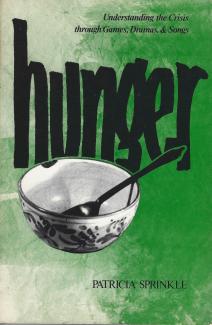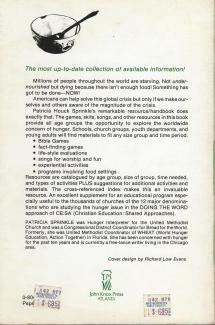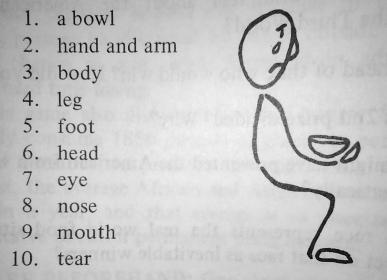Hunger is a collection of resources aimed at church groups and the like, games, songs, playlets, and other activities intended to raise awareness of world hunger, though one might question whether these might do much beyond reassuring well-meaning people that they are doing their bit. Will anyone have been inspired by games such as “The Race”, I wonder, in which contestants strive to win a first prize of a piece of paper bearing the legend “1850 lbs. of grain”, the amount consumed by a typical American, or a share in the runner-up prize, representing 400 lbs. of grain per head, the diet of “the average African and Asian”?
PROCEDURE: Place players at the starting line. Choose one player arbitrarily to be the American, and send him/her half-way towards the finish line to await the starting signal. Tell other players they are members of Third World countries.
The object of the game is to win the race. Be sure all players understand that! Those who don’t get First Prize are entitled to as big a piece of Second Prize as they can tear off when they reach the finish line.
Then assign handicaps to most of the players from the Third World. Some players may move up between the starting line and the American but must run backwards. Some players must run sideways, some must hop on one foot, some must crawl, some must crawl backwards, and one player is not allowed to run at all.
If this ends in violence, as seems likely, then it’s all part of the learning experience. That bloody nose will undoubtedly give little Johnny an insight into the struggles of his unlucky counterparts in far-off lands.
“The Race”, though, is innocuous compared to the activity that immediately follows it, “Starve the Man”, based on the old game of Hangman but in even more dubious taste. Each participant selects a word “dealing with a cause of hunger”, or the name of a “hungry country”, then, as their fellow competitors correctly guess the letters of the chosen word, proceed step by step to draw the “man”, following the list of his parts:
The list of “causes of hunger” is of interest, as much for what is omitted:
| weather conditions | drought, floods, rain, heat, cold, monsoons, hurricanes, earthquakes, etc. |
| natural disasters | poor seeds, insects, blight, bugs, worms, etc. |
| military spending | bombs, bullets, soldiers, war, budgets, etc |
| trade laws | laws, politicians, greed, balance of trade, products, money, corporations, etc. |
| overpopulation | babies, people, mothers, fathers, elderly, etc. |
| illiteracy | no books, poor education, no education, etc. |
| land use | peasants, owners, rich, big farms, industrialization, etc. |
| urbanization | ghettos, slums, cities, unemployment, etc. |
| lifestyle | affluence, overconsumption, indifference, ignorance, television, junk foods, etc. |
| transportation | poor roads, trucks, regulations, etc. |
Shh, don’t mention wealthier nations and their foreign policies …
As this is an overtly Christian publication, Jesus has to be given a prominent place and so children are encouraged to learn everything he ever said that referred to food, whether it has anything to do with world hunger or not. They are to make posters and placemats illustrating, among other sayings:
“You are the salt of the earth”, (Matthew 5:13)
“A sound tree cannot bear evil fruit” (Matthew 7:18)
“The kingdom of heaven is like a grain of mustard seed” (Matthew 13:31-32)
A “drama” entitled “Unto One of the Least” by Dorothy J. Collins actually pretty well sums up the whole enterprise. This masterpiece features the following list of characters:
Jane — an active churchwoman
Henry — her husband
Long-haired youth seeking work
Older man — city maintenance employee
Disheveled woman
Off-stage voice for the Lord
A footnote requests that the casting “be as representative as possible of various ethnic groups”.
Jane returns home after church and is then visited in turn by the long-haired youth, the older man, and the disheveled woman who has been subjected to a sexual assault. Each asks Jane for something and she pointedly does the very least possible before sending them on their way, giving the youth just a crust of bread, the older man a glass of water and the woman an old robe to cover her nakedness. After they have all gone Henry appears and Jane, agitated, recounts how “three beggars” had come to the door. Henry asks about the woman to which Jane replies:
I told her that I really didn’t want to get involved, and I sent her to the policeman down the street. Henry, do you realize that man may still be running around loose?
I hope they catch him, and he rots in prison. It’s just so much excitement, Henry. I… I can’t take it. Oh, oh! (Collapses on couch.)
Jane is so stressed out by having to deal with the succession of needy folk that she does not merely collapse but dies. Exit Henry in search of help and the house lights fall. When they come back again, Jane is alone on the stage. She is now in heaven, and receives her due reward: a crust of bread, a glass of water, and her old robe. The voice of the Lord is heard, off-stage, “slowly and emphatically”:
Verily I say unto you, in as much as you have done it unto one of the least of these …
Wow. Powerful stuff, eh? Makes you think: feed the world, or you might be hungry in heaven and have to wear last year’s fashion.



This material was obviously…
This material was obviously meant for church groups, not the general public. The games are silly, but well-intentioned, which I assume was to make American children more aware of world hunger. And, I think she does include developed nations and their foreign policies under military spending, trade laws, and lifestyle. I don’t think this book would have made a huge impact on its congregations, but a few people might have stopped thinking about just themselves for a few minutes. Success!